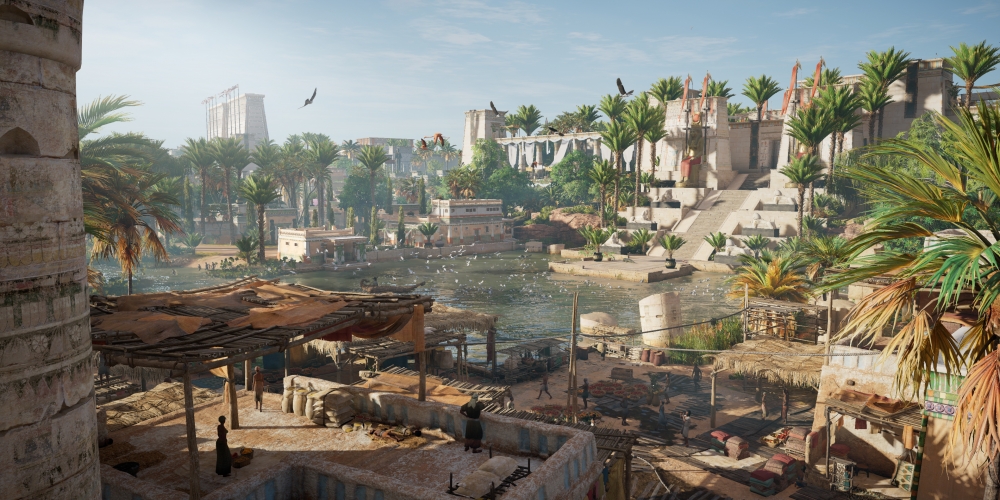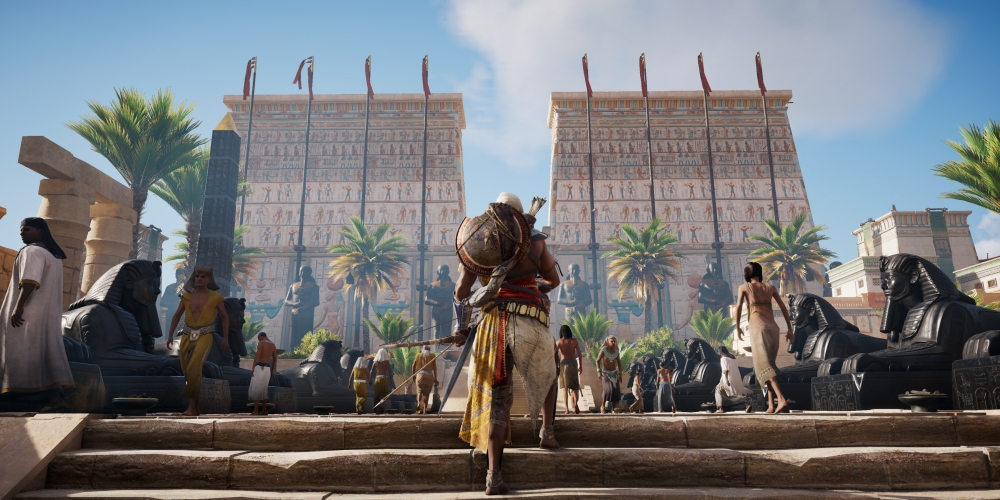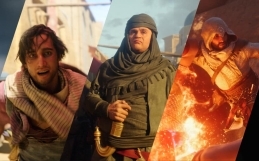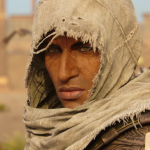Three years before the release of Assassin’s Creed Origins, PCGames.de visited Ubisoft Montreal and talk with the senior developers regarding the emergence of the Egyptian adventure. Here’s a translated version of the article:
In the last part of our Origins series the quest and battle system as well as the hero Bayek were in focus, we now come to the most important in an open world game: to the game world. As most have already noticed, Assassin’s Creed: Origins is settled in ancient Egypt. But whoever thinks we are now on the order of such famous pharaohs as Djoser or Cheops are deceiving itself tremendously. Ubisoft Montreal has opted for a scenario that is about 60% Is spoken during the reign of the famous Queen Cleopatra. Accordingly, the distance from the era is significantly further from the epoch of the Old Kingdom (about 2700-2200 BC) than the assassination adventure of our present time – you should be aware of this when you are now a Medjau Bayek Founder of the Assassin Order.
After all, the time that the pyramids have stood for the inhabitants of the game world for thousands of years in the valley of Giza, Tutankhamun has found its last peace for more than a millennium, and the Egyptian warships have long been meaningless for world politics. Instead, the adventure is at the end of the Roman Republic, a historically exciting era of world history. At this time, the first triumvirate of Gaius Julius Caesar, Gnaues Pompey Magnus and Marcus Licinius Crassus fought for the supremacy in the Roman Empire, with the result that Caesar was able to eliminate his former allies, but then, at the moment of the triumph of Marcus Junius Brutus and His relatives were murdered during a Senate meeting-a chapter of the world history which Shakespeare and his famous play have probably immortalized forever.
Assassin’s Creed Origins: A World of Change
But the domestic policy of the Roman Empire plays a rather subordinate role for the citizens of Egypt at that time. The former empire was conquered by Alexander the Great almost 300 years ago and has thus become Greek as part of the Macedonian empire. The famous Queen Cleopatra, with whom we are involved, belongs, for example, to the House of the Ptolemies, a dynasty founded by the most capable General of Alexander. Nearly one-fifth of the population of that time in Egypt also speaks Greek, above all the rulers. The Hellenistic also makes itself felt everywhere in Egypt. Whether Greek settlements such as the capital city Alexandria, the immensely important sea trade with the Greek neighbors in the Mediterranean or deities like Zeus and Athena: the Greek culture has been displacing ancient Egyptian habits and customs for nearly 300 years.
Altogether, the last pre-Christian century in the Nile Delta is a time of upheavals. This is also evident in our hero, who carries the office of a Medjau. Medjaus were known in ancient Egypt as a sort of police officer who was concerned about everyday problems such as crime. In the game world, older people still have great respect for Bayek and his colleagues, but many of the younger ones are no longer interested in old customs and do not even know what a Medjau is. There are also small quarrels between Egyptians and Greeks on the streets of Alexandria every day, discussions between Priests of Amun and Zeus, or power struggles in the royal house between traditionalists and Hellenists.
Assassin’s Creed Origins Preview: Gorgeous Implementation
We see these conflicts in Assassin’s Creed: Origins in a gigantic game world – the largest of the series! From Alexandria in the north to Memphis in the south we can move to Gusto to see the port of the capital, as well as the ancient temples of the former royal city. In between we experience a varied game world, which consists not only of desert but also thanks to the Nile also with beautiful green landscapes and small settlements.The beauty: The developers have – as with the predecessors – made a huge effort in the design of the Open World.All important monumental buildings of Egypt were visited, the light conditions of the desert analyzed, the effects of the flood at the Nile Delta examined and obendrein advise by a historian.
The result can be seen in our opinion. We were able to play the high-resolution Xbox-One-X version in Montreal, and we were just baffled, how realistic the monumental buildings in the game look like, how wonderful monotonous desert landscapes at a sunset and exactly how exactly temple impressions were implemented in the game , In the end, we were quite happy that the developers had decided to delete the Minimap-display , which we had known from the predecessors – so we had simply more pleasure to explore. In addition, the game world gets an extra portion of liveliness through the many passers-by and animals, which makes us feel like on a holiday in ancient Egypt. In the end, the game decides whether Assassin’s Creed: Origins is actually a masterpiece. After studying our studios, we are in any case good at building the basic framework of a quest structure, combat system, hero and game world on a solid foundation. After the test in October we then also know whether the pillars are also armed against wind and weather.
For the original article in german, visit the PCGames.de.










